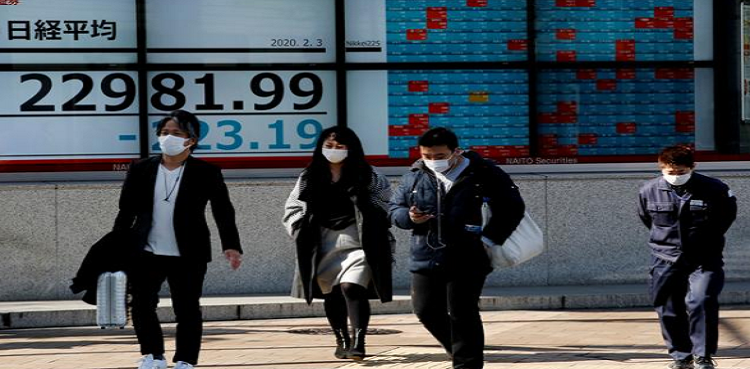
TOKYO: Global share markets were headed for the worst week since the depths of the 2008 financial crisis as investors ditched risky assets on fears the coronavirus would become a pandemic and derail economic growth.
Asian stocks tracked another overnight plunge in Wall Street’s benchmarks on Friday with the markets in China, Japan and South Korea all posting heavy losses.
Hopes that the epidemic that started in China would be over in a few months and economic activity would return to normal have been shattered, as new infections reported around the world now surpass those in China.
The worsening global threat from the virus prompted investors to rapidly step up bets the U.S. Federal Reserve would need to cut interest rates as soon as next month to support economic growth.
“We don’t even need to wait for economic data to see how badly the economy is being hit. You can tell that the sales of airlines and hotels are already falling by a half or something like that,” said Tomoaki Shishido, senior economist at Nomura Securities.
MSCI all country world index .MIWD00000PUS fell 0.3% after 3.3% drop on Thursday. So far this week it has lost 9.2%, on course for its biggest weekly decline since a 9.8% plunge in November 2008.
Wall Street shares led the rout as the S&P 500 .SPX fell 4.42%, its largest percentage drop since August 2011.
It has lost 12% since hitting a record close on Feb. 19, marking its fastest correction ever in just six trading days while the Dow Jones Industrial Average .DJI fell 1,190.95 points, its biggest points drop ever.
The CBOE volatility index , often called the “fear index”, jumped to 39.16 on Thursday, the highest level in about two years, well out of the 11-20 range of recent months.
The index, which measures expected swings in U.S. shares in the next 30 days, often shoots up to around 50 as bear market selling hits its heaviest although it approached 90 during the 2008-09 financial crisis.
In Asia, MSCI’s regional index excluding Japan .MIAPJ0000PUS shed 1.4%. Japan’s Nikkei .N225 gave up 3.3% on rising fears the Olympics planned in July-August may be called off due to the coronavirus.
Australian shares dropped 2.8% to a six-month low while South Korean shares .KS11 shed 2.1%.
“The coronavirus now looks like a pandemic. Markets can cope even if there is big risk as long as we can see the end of the tunnel,” said Norihiro Fujito, chief investment strategist at Mitsubishi UFJ Morgan Stanley Securities. “But at the moment, no one can tell how long this will last and how severe it will get.”
WHO Director General Tedros Adhanom Ghebreyesus said the virus could become a pandemic as the outbreak spreads to major developed economies such as Germany and France.
The global rout knocked mainland Chinese shares lower, which have been relatively well supported this month, as new coronavirus cases in the country fell and Beijing doled out measures to shore up economic growth.
CSI300 index of Shanghai and Shenzhen shares .CSI300 dropped 2.4%, on track to post its first weekly loss in three.
Fears of a major economic slump sent oil prices to their lowest level in more than a year.
U.S. crude futures CLc1 fell 1.6% to $46.35 per barrel, having lost 13.2% so far on the week, which would be the deepest fall in more than five years.
As investors flocked to the safety of high-grade bonds, U.S. yields plunged with the benchmark 10-year notes yield hitting a record low of 1.241%. It last stood at 1.274% US10YT=RR.
That is well below the three-month bill yield of 1.439% US3MT=RR, deepening the so-called inversion of the yield curve. Historically an inverted yield curve is one of the most reliable leading indicators of a U.S. recession.
Expectations the Fed will cut interest rates to cushion the blow are rising in money markets. Analysts say Fed funds futures <0#FF:> are now pricing in more than a 50% chance of a 25 basis point cut at the central bank’s March 17-18 meeting.
As investors rushed to safe assets, gold XAU= stood at $1,646.4 near seven-year high of $1,688.9 hit earlier this month.
In currency markets, the yen rose to a three-week high of 109.33 to the dollar JPY= and last stood at 109.40.
The euro stood at $1.0993 EUR=, having jumped over 1% in the previous session, the biggest gain in more than two years as investors wound back bets against the currency versus the dollar.
The post World stocks set for worst week since 2008 as virus fears grip markets appeared first on ARY NEWS.
from ARY NEWS https://ift.tt/32A9Lef
Comments
Post a Comment